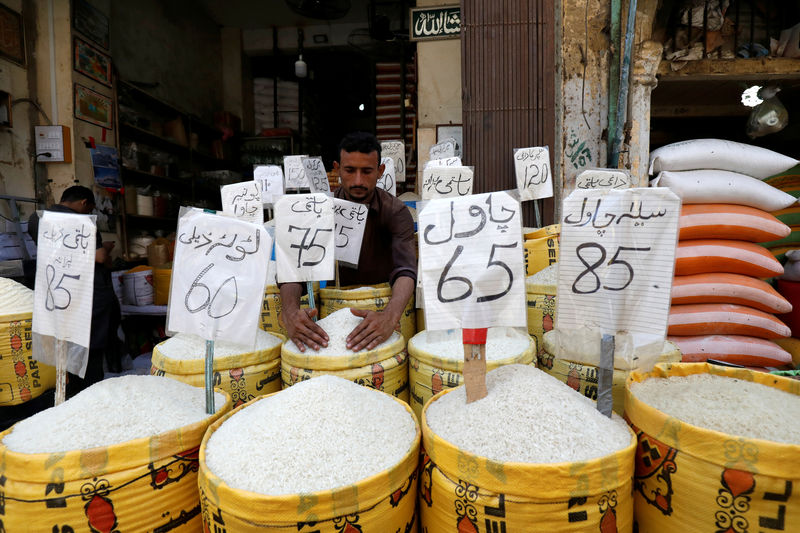By Saad Sayeed and Syed Raza Hassan
ISLAMABAD/KARACHI (Reuters) - Pakistan's surging petrol prices have more than halved the income of taxi driver Yasir Sultan, just one of many consumers whose faith in a government elected last year on a pledge to help the poor has been shattered.
Inflation at its highest in more than five years has shocked many Pakistanis who voted for Prime Minister Imran Khan and his promise to eradicate poverty, create jobs and build an Islamic welfare state.
"Imran Khan has said big things about getting rid of poverty, but he isn't erasing poverty. He is erasing the poor," Sultan, 30, told Reuters.
"Sometimes I think I should set this taxi on fire," he said from behind the wheel of his rundown 1980s-era Suzuki Mehran.
Wrestling with a ballooning current account deficit as it seeks a 13th bailout package from the International Monetary Fund, the government has a hard choice - impose pain now or face a balance of payments crisis that could crash the economy.
Foreign reserves of $8.5 billion are better than the start of the year, but barely cover two months' worth of imports.
"Demand compression is part of stabilization to bring down current account and trade deficits," said Asad Sayeed, an economist at the Collective for Social Science Research.
Inflation was over 9.4 percent in March, its highest since November 2013, with strong increases in food and energy, the two most sensitive items for most consumers.
The central bank forecasts growth at 3.5-4 percent in the 12 months to end June, well off a government target of 6.2 percent.
With a large pool of surplus labor keeping wage rises in check, living standards will suffer, Sayeed said.
"I voted for PTI believing in Khan's slogan for the change. Now, I am repenting," said Sara Salman in the bustling eastern city of Lahore, referring to the prime minister's party, Pakistan Tehreek-i-Insaf.
With the rupee losing over a quarter of its value in the past year, the squeeze is acute in the creaking power sector where the government is under pressure to cut subsidies cushioning consumers against sharp price hikes.
Authorities on Monday hiked petrol prices by 6 rupees to 98.88 rupees ($0.70) a liter, bringing pain to skilled workers who earn 1,000-1,300 rupees ($7.08-9.20) a day and laborers who make up to 600-800 rupees.
The price hikes will keep consumers away from all but essential items, economists say.
"The fiscal trajectory now depends on what extent the government is going to adjust energy prices," said Saad Hashmey, chief economist at Topline Securities, adding it has to fix the energy deficit and bring earnings in line with production costs.
"If they are to go the full extent they need to plug the gap, then inflation in a few months will go into double digits," he said.
FRIENDLY COUNTRIES
Finance Minister Asad Umer has said an IMF deal could be agreed by May, its 13th bailout since the late 1980s and the last one needed by Pakistan, the government says.
While talks continue, Pakistan has sought help from China, its partner in the $60-billion China-Pakistan Economic Corridor, part of Beijing's vast Belt and Road infrastructure initiative.
Saudi Arabia and the United Arab Emirates have also extended about $11 billion in loans and credit arrangements on oil deliveries in recent months.
The government says it is stepping up efforts to replace imports with domestic production and build up an export sector that has traditionally relied on textiles with special economic zones designed to attract new investment.
It is also trying to widen the tax net to boost collections, but has struggled on both fronts.
Rising oil prices and a currency devaluation "were bound to happen", Information Minister Fawad Chaudhry said this week, adding, "God willing, a better time will be coming."
For a government that promised an "Islamic welfare state" focused on uplifting the poor, the forecast is uncomfortably vague, observers say.
"They have to undertake a very painful economic adjustment," said Khurram Hussain, business editor of Pakistan's Dawn Newspaper. That means higher taxes and interest rates, lower imports and government spending, and a devalued rupee, he said.
"In that environment it is extremely difficult to deliver on welfare oriented promises," Hussain said.
While economists believe Pakistan has no choice but to cut spending and raise prices, consumers' patience is wearing thin.
"The current financial policies and price-hike shows contempt for the people," said Muhammad Waqas, a Lahore school teacher. "If the PTI government cannot resolve these problems, it should step down."
